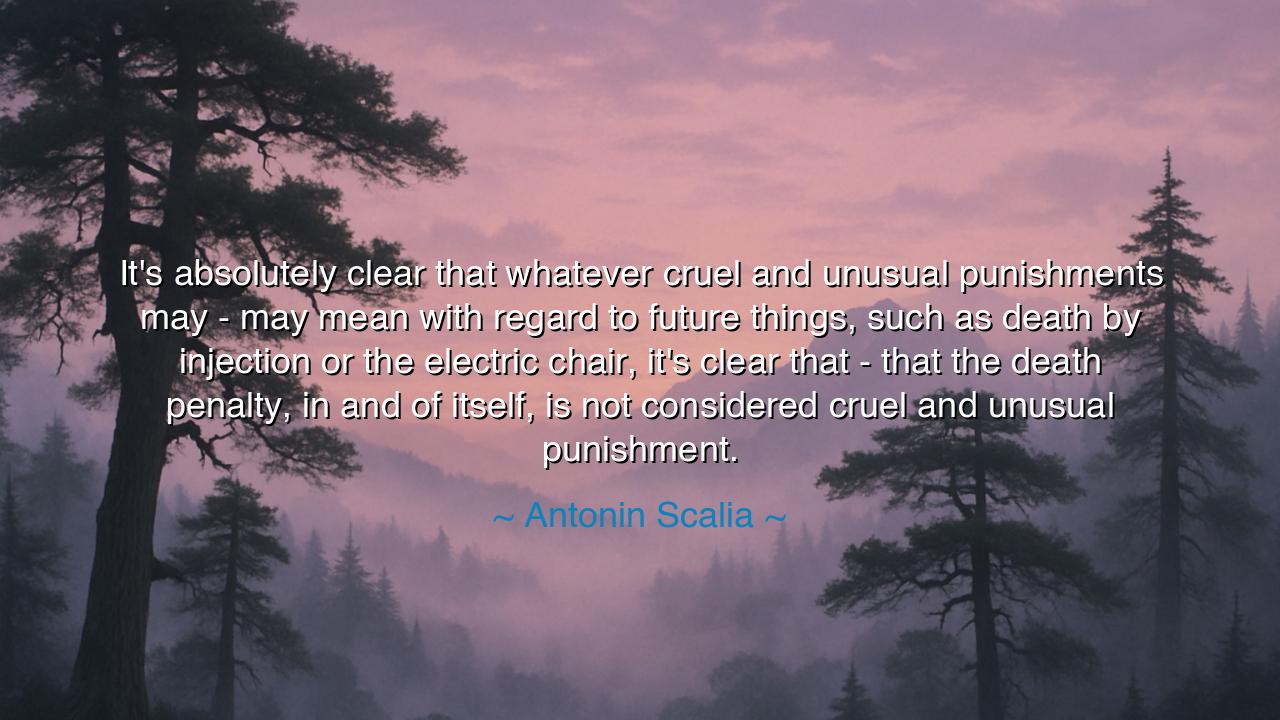
It's absolutely clear that whatever cruel and unusual punishments
It's absolutely clear that whatever cruel and unusual punishments may - may mean with regard to future things, such as death by injection or the electric chair, it's clear that - that the death penalty, in and of itself, is not considered cruel and unusual punishment.






In the annals of human history, justice has always been a subject of great debate and profound consequence. Antonin Scalia's words, “It's absolutely clear that whatever cruel and unusual punishments may - may mean with regard to future things, such as death by injection or the electric chair, it's clear that - that the death penalty, in and of itself, is not considered cruel and unusual punishment,” speak to a central issue in society’s understanding of punishment and retribution. Scalia’s statement reflects a longstanding philosophical and legal discussion regarding the death penalty and the question of whether it constitutes a just form of punishment or one that violates the fundamental principles of human dignity and justice. His perspective places the death penalty within a historical context, suggesting that what was once seen as acceptable in terms of punishment, may no longer hold the same weight in the modern era, but still remains firmly embedded in the concept of legal retribution.
The concept of retribution can be traced back to ancient civilizations, where the idea of just punishment was an integral part of maintaining order and ensuring balance within society. The Code of Hammurabi, one of the earliest and most famous sets of laws from ancient Babylon, made it clear that the punishment for crimes should be proportionate to the offense, laying the groundwork for what would become the idea of an eye for an eye. This retributive justice was not about revenge, but about maintaining societal order, where each individual’s actions had consequences that reflected the severity of the crime committed. The death penalty, as part of this system, was seen as a way of preserving the social fabric, ensuring that those who committed the most heinous offenses would be permanently removed from society.
In the ancient Roman world, Cicero argued that the death penalty should be reserved for the most serious offenses, as a means of preserving justice in the face of wrongdoing. To Cicero, and many of his contemporaries, the death penalty was not seen as inherently cruel or unusual, but rather a tool of retribution and order. This view of the death penalty as a necessary evil was passed down through the centuries, even as the philosophical and ethical frameworks surrounding punishment evolved. Scalia’s statement, in many ways, is a continuation of this longstanding belief that the death penalty is not inherently cruel, but rather a necessary and just response to crimes deemed to be of the most grievous nature.
However, as civilizations progressed and the concept of human rights began to take greater precedence in legal and moral discussions, the idea of what constitutes “cruel and unusual punishment” came under intense scrutiny. In more modern times, especially in the Western world, there has been a growing movement against the death penalty—not just on the grounds of its severity, but because it was seen as inherently flawed and inhumane. The fear of wrongful convictions, the psychological toll of waiting on death row, and the growing belief in the sanctity of human life led many to question whether such a punishment was morally acceptable in a society that prided itself on progress and enlightenment.
Scalia’s quote touches on this deep tension: while he argues that the death penalty itself may not be inherently cruel, the methods by which it is carried out—such as death by injection or the electric chair—can raise concerns about human dignity. These methods, especially when botched or inconsistent, bring into question whether the state can ever truly achieve a just form of retribution without falling into the realm of the inhuman or the unjust. Yet, Scalia’s unwavering position reveals his belief in the sanctioned authority of the state to decide matters of life and death, without being bound by modern moral relativism.
The lesson we can draw from Scalia’s statement, and from the centuries of debate surrounding the death penalty, is this: justice is a complicated and evolving concept that requires us to constantly examine and reassess our values, methods, and priorities. What is considered just in one era may not be acceptable in another, as the collective conscience of society shifts and grows. Retributive justice, while a central tenet in ancient legal systems, must be balanced with modern ethical considerations, such as the need for humane treatment and the preservation of human dignity. As societies evolve, we must continue to ask ourselves: What kind of justice do we want to create? And what does that justice look like in an era where compassion and human rights are central to our collective identity?
In our own lives, we must engage in this same kind of reflection: when we confront challenges, when we seek justice, or when we make decisions that affect others, we must always ask whether our actions are proportional, fair, and humane. The journey toward justice is a continuous one, where we must not only uphold order but also ensure that our actions reflect the higher ideals of mercy, understanding, and compassion. Whether in matters of law, morality, or personal decision-making, we must strive to weigh the consequences of our actions with wisdom and foresight, ensuring that we leave a legacy of justice that is enlightened and equitable for all.






AAdministratorAdministrator
Welcome, honored guests. Please leave a comment, we will respond soon